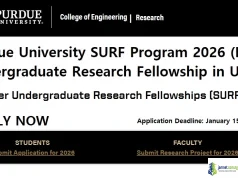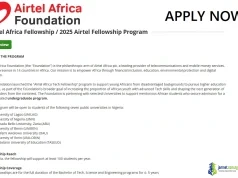The University of Michigan CHEAR Fellowship (Susan B. Meister Child Health Evaluation and Research Center) is a fully funded, two-year, interdisciplinary program for highly qualified Clinical Fellows (MD/DO), Postdoctoral Researchers (PhD or equivalent), and non-physician clinicians seeking intensive training in pediatric health services and outcomes research. The program is designed to cultivate the next generation of leaders in child health policy and population health. Benefits are comprehensive, including a competitive salary aligned with NIH guidelines, a full benefits package, and complete tuition coverage for clinical fellows pursuing a relevant Master’s degree at the University of Michigan (e.g., in Public Health or Clinical Research Design).
The fellowship requires United States citizenship or permanent residency and is accepting applications until December 31, 2025, for a 2026 start date. Key components include structured mentorship from a faculty committee, weekly didactic learning seminars, and experiential research training focused on producing at least two first-authored, peer-reviewed publications. The research focus areas are broad, covering pediatric health informatics, healthcare economics, health equity, and Medicaid policy.


Have you ever considered how healthcare decisions are made for millions of children across the nation? Do you dream of moving beyond individual patient care to influence wide-ranging public health policies and create more equitable health systems for pediatric populations? If your ambition lies at the intersection of clinical practice, rigorous research, and transformative policy, then a specialized training opportunity is essential for realizing that potential.

Join our Telegram Channel for Instant Scholarship Updates
The Susan B. Meister Child Health Evaluation and Research (CHEAR) Center is extending a remarkable invitation for its 2026–2027 cohort. This is not simply an academic position; it is a fully funded medical research fellowship designed to create the future leaders who will reshape pediatric healthcare in the United States. This comprehensive guide will walk you through every critical detail of this prestigious program, from the unparalleled financial support and world-class mentorship to the specific steps you must take to submit a successful application before the crucial deadline. Read on to discover how this two-year interdisciplinary program can propel your career from excellence in practice to influence in policy.
What is the University of Michigan CHEAR Fellowship?
The University of Michigan CHEAR Fellowship is a highly competitive, two-year training program centered in Ann Arbor, Michigan, committed to training experts in the field of pediatric health services and outcomes research. Unlike traditional clinical fellowships that focus solely on subspecialty clinical skills, the CHEAR program emphasizes the methodological and analytical skills needed to study healthcare delivery systems, evaluate policy interventions, and measure the quality and value of medical care for children.
The mission of the CHEAR Center is straightforward: to generate high-impact evidence that directly informs child health policy, practice, and population health initiatives. Fellows are immersed in an environment where they learn to conduct research that matters—work that addresses real-world issues like disparities in care access, the financial burden of childhood illness, and the efficiency of public health programs such as Medicaid. This is a commitment to translating data into actionable knowledge, ensuring that research moves from the journal page directly into the clinic and the legislative chamber.
A Dedication to Interdisciplinary Training
One of the most valuable aspects of the CHEAR experience is its deeply interdisciplinary program structure. Child health problems are complex; they require solutions that cross traditional academic boundaries. For this reason, the program draws faculty and resources from across the University of Michigan, including the Medical School, the School of Public Health, and the Institute for Healthcare Policy and Innovation. This ensures that fellows gain a broad perspective, learning not only clinical medicine but also essential disciplines such as:
- Applied Economics: Understanding the cost-effectiveness and financial impact of pediatric interventions.
- Decision Science: Utilizing modeling and simulation to predict outcomes of different policy choices.
- Qualitative and Quantitative Methods: Mastering the full spectrum of research tools necessary for robust data analysis.
- Policy Analysis: Learning how research findings are translated and communicated to lawmakers and healthcare executives.
Benefits of a Fully Funded Medical Research Fellowship
Financial concerns should not be a barrier to pursuing high-level academic research training. The University of Michigan CHEAR Fellowship is structured to eliminate this worry, providing comprehensive support that allows fellows to focus entirely on their research and skill development.
Competitive Salary and Comprehensive Benefits
Fellows receive a competitive salary that is calculated and aligned with established National Institutes of Health (NIH) guidelines for postdoctoral and research training positions. This ensures that the compensation is commensurate with the level of expertise and dedication expected of these advanced trainees. In addition to the salary, the fellowship provides a full, comprehensive benefits package, covering essential needs such as health insurance, dental coverage, and retirement options. This holistic financial support is a defining characteristic of a truly fully funded opportunity.
Tuition Coverage for Advanced Degrees
Perhaps the most significant financial benefit for clinical fellows is the tuition funding for a Master’s degree. For eligible MD/DO candidates, the program fully covers the cost of pursuing an advanced degree at the University of Michigan in one of several highly relevant fields:
- Master of Science in Health and Health Care Research (MHCR)
- Master of Science in Clinical Research Design and Statistical Analysis
- Master of Public Health (MPH)
Research Infrastructure and Resources
Beyond personal compensation, the fellowship provides unparalleled research support and access. Fellows gains immediate entry to the University of Michigan’s vast research ecosystem, including:
- Rich Data Resources: Access to large, proprietary, and complex datasets critical for population health and health services research, such as state Medicaid files, electronic health record data, and national survey data.
- Expert Faculty and Staff: Dedicated access to statisticians, data scientists, and project managers who assist in study design, data analysis, and manuscript preparation.
- State-of-the-Art Facilities: Full use of the university’s libraries, computational resources, and collaborative research spaces.
Who is Eligible for This Elite Opportunity?
The CHEAR Center actively seeks a diverse group of highly motivated applicants. The program is specifically structured to accommodate individuals at different stages of their academic and professional journeys, provided they share a commitment to pediatric health services research.
1. Physicians (MD or DO)
Clinical applicants form a core part of the fellowship. The program is ideal for physicians who wish to dedicate a significant portion of their career to research and policy advocacy. Eligible candidates include:
- Third-year Pediatrics Residents or Fourth-year Internal Medicine/Pediatrics Residents from any institution within the United States. This allows residents to transition immediately into a dedicated research track after completing their primary clinical training.
- First-year Pediatric Subspecialty Fellows who are already at the University of Michigan Medical School.
- Incoming Clinical Fellows who have successfully matched into a subspecialty program at the University of Michigan.
- Pediatric Faculty Members at the University of Michigan who hold instructional or clinical track appointments and are transitioning into research-intensive roles.
2. Postdoctoral Researchers (PhD and Equivalent)
The fellowship also warmly welcomes individuals holding or completing a doctoral degree. This category is crucial for bringing diverse methodological expertise into the health field. Postdoctoral Researchers often come from disciplines such as:
- Public Health (Health Management and Policy, Epidemiology)
- Health Policy or Health Services Administration
- Decision Sciences or Management Science
- Economics or Econometrics
- Sociology or Psychology with a focus on population health
Furthermore, PhD applicants who are also applying to the UM Pediatric Psychology Fellowship may be able to combine the two trainings, creating a unique and powerful blended track. This merging of clinical psychological insights with broad health systems analysis is highly innovative.
3. Non-Physician Clinicians
Recognizing the vital role all healthcare professionals play, the program encourages applications from non-physician clinicians. This includes professionals such as:
- Nurses (RNs, NPs)
- Physician Assistants (PAs)
- Mental Health Practitioners (LCSWs, Psychologists)
The Core Pillars of CHEAR Training
The two-year curriculum is strategically built upon four interconnected pillars, ensuring a robust and well-rounded research education. This structure moves far beyond passive learning; it is an active apprenticeship designed for high-level mastery.
1. Didactic Learning
Fellows participate in rigorous, weekly CHEAR seminar series. These sessions feature a mix of internal faculty presentations and external speakers who are leaders in health services and outcomes research. In addition to these seminars, fellows engage in targeted skill-building workshops and methodological training sessions. These workshops cover advanced topics, including:
- Advanced Biostatistics and Regression Modeling
- Qualitative Research Techniques (e.g., focus groups, in-depth interviewing)
- Survey Design and Implementation
- Grant Writing Strategies
This focused instruction ensures that every fellow, regardless of their background, develops a shared, sophisticated understanding of research methodology.
2. Structured Mentorship
Mentorship is the bedrock of the CHEAR program. Each fellow is immediately paired with a primary mentor whose research interests closely align with the fellow’s specific goals. Crucially, they are also assigned a mentorship committee consisting of two to three faculty members from diverse disciplines.
This structured committee approach offers multiple perspectives on the fellow’s research, career development, and policy interpretation. Regular, scheduled meetings with both the primary mentor and the full committee ensure individualized learning and accountability, guiding the fellow’s progress from initial project conception to final publication.
3. Experiential Research Training
The core of the fellowship is the requirement that fellows must conduct two independent research projects in the field of pediatric health services or population health. This experiential learning is highly focused on achieving tangible results. The expected deliverables are demanding but achievable: fellows are required to produce at least two first-authored, peer-reviewed publications by the conclusion of the two-year program. The projects are supported by the vast data resources of the University of Michigan and the consistent oversight of their mentorship team.
4. Professional Development and Networking
Fellows are continuously encouraged to present their work in progress to the wider CHEAR faculty, receiving critical feedback that shapes their projects. Furthermore, the fellowship provides funding and support for fellows to attend major national conferences. This professional engagement is essential for building a national reputation and making important connections. Key conferences typically include:
- Pediatric Academic Societies (PAS): Essential for clinical and basic science pediatric research.
- AcademyHealth Annual Research Meeting: The premier conference for health services research and policy.
Key Research Focus Areas
The research conducted by University of Michigan CHEAR Fellowship trainees is directly aimed at resolving pressing issues in child health. The faculty are actively engaged in innovative areas, and fellows are encouraged to carve out their own niches within this broad framework. Research areas include, but are not limited to:
- Pediatric Population Health Informatics: Utilizing big data, electronic health records, and predictive modeling to identify at-risk child populations and optimize care pathways.
- Economic Evaluation and Cost-Effectiveness: Analyzing the value of new treatments, prevention programs, and clinical guidelines to ensure that resources are used efficiently.
- Barriers to Care and Health Equity: Investigating systemic disparities in access, quality, and outcomes based on race, socioeconomic status, and geographic location. This is a critical focus for advancing social justice in medicine.
- Medicaid Policy and Healthcare Financing: Studying the impact of public insurance programs on child health outcomes and access, informing state and federal policy decisions.
- Quality Improvement and Outcome Measurement: Developing and testing new metrics and strategies to ensure high-quality care is consistently delivered across all pediatric settings.
- Transition to Adult Healthcare: Examining the complex process of moving adolescents with chronic conditions from pediatric to adult systems, ensuring continuity and successful long-term management.
Step by Step Guide for the Application Process : How to Apply for the University of Michigan CHEAR Fellowship
Securing a spot in this highly desired program requires careful planning and a meticulously prepared application. Interested candidates must ensure they meet the eligibility requirements first, specifically noting that the program currently supports US citizens and permanent residents only due to visa sponsorship limitations.
Required Application Components
To be considered for the 2026–2027 cohort, you must prepare and submit the following documents:
- Fellowship Application Form: This is typically found on the official CHEAR website and must be completed accurately.
- Curriculum Vitae (CV): A current CV that clearly details your educational background, clinical training, research experience, and publication history. Be sure to indicate your exact current academic or training status.
- Statement of Purpose (1,000 Words Maximum): This essay is perhaps the most important document. It must articulate:
- Your professional background and specific clinical or academic expertise.
- Your current research interests within pediatric health services or policy.
- Your motivation for applying to the CHEAR Fellowship specifically and how its resources will enable you to achieve your long-term career goals.
- Writing Sample: Provide one high-quality example of your scholarly work. This could be a published manuscript, a submitted paper, a doctoral dissertation chapter, or a detailed research report. This demonstrates your ability to communicate complex ideas effectively.
Application Deadline: December 31, 2025.
CLICK HERE TO APPLY
For more Information Click Here
Frequently Asked Questions (FAQ) About the CHEAR Fellowship
1. What is the main purpose of the University of Michigan CHEAR Fellowship?
The main purpose of the University of Michigan CHEAR Fellowship is to provide two years of intensive, fully funded medical research fellowship training to prepare clinical fellows and PhD graduates to become independent investigators and future leaders in pediatric health services research and child health policy development.
2. Is the CHEAR Fellowship truly fully funded, and what does that include?
Yes, the program is fully funded. This includes a competitive annual salary that aligns with NIH standards, a comprehensive benefits package, dedicated research support and resources, and the full coverage of tuition costs for eligible clinical fellows who pursue a Master’s degree at the University of Michigan.
3. What are the eligibility criteria regarding citizenship for the two-year interdisciplinary program?
The University of Michigan CHEAR Fellowship is currently open only to US citizens and permanent residents only. The program does not have the capacity to provide visa sponsorship for international applicants at this time.
4. What types of Master’s degrees are covered by the tuition funding?
For eligible clinical fellows (MD/DO), the tuition funding covers Master’s degree programs at the University of Michigan that are relevant to research methodology, such as a Master’s in Health and Health Care Research, Clinical Research Design, or a Master of Public Health (MPH).
5. What are the required application documents for the December 31 2025 Deadline?
Applicants must submit a completed fellowship application form, a current Curriculum Vitae (CV), a Statement of Purpose (1,000 words maximum) outlining their research interests, and a writing sample such as a published or submitted manuscript.
6. What kind of mentorship opportunities does the CHEAR program provide?
The fellowship provides structured mentorship where each fellow is paired with a primary research mentor and a faculty mentorship committee of two to three experts. This committee offers multidisciplinary guidance on research projects and career development.
7. What kind of research is conducted by the postdoctoral researchers and clinical fellows?
Fellows engage in innovative pediatric health services research, focusing on areas like the economics of child health, health equity and disparities, Medicaid policy, quality improvement, immunization access, and decision modeling for acute care outcomes.
8. Is prior research experience necessary to apply for this MD PhD fellowship track?
While the program supports candidates with varied backgrounds, a strong interest and some demonstration of aptitude for research—typically evidenced by a strong CV, relevant coursework, or a quality writing sample—are essential for a competitive application.
9. What is the expected research output by the end of the University of Michigan CHEAR Fellowship?
A key component of the experiential training is the requirement to complete two independent research projects. Fellows are expected to produce and submit at least two first-authored, peer-reviewed publications by the conclusion of the two-year fellowship period.
10. Can non-physician clinicians like nurses or physician assistants apply?
Yes, the University of Michigan CHEAR Fellowship is open to non-physician clinicians. However, these applicants must contact the Program Director prior to submitting their application to confirm their specific research focus aligns with the program’s capacity and goals.













